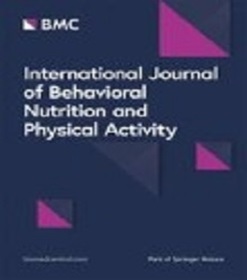住宅区快餐店曝光率变化对体重指数变化的影响:来自 92 211 名生命线参与者的纵向证据
IF 5.5
1区 医学
Q1 NUTRITION & DIETETICS
International Journal of Behavioral Nutrition and Physical Activity
Pub Date : 2024-03-14
DOI:10.1186/s12966-024-01577-8
引用次数: 0
摘要
有关快餐店暴露与身体质量指数(BMI)之间关系的证据仍不一致,而且主要基于横断面研究。我们研究了快餐店暴露量的变化与体重指数变化之间的关系,以及这些关系在多大程度上受年龄和快餐店基线暴露量的影响。我们使用了 Lifelines 成人队列(N = 92,211 人)的 4 年纵向数据。通过地理编码,将基线和随访时的参与者住址与包含快餐店位置的登记簿联系起来。快餐店暴露量的变化被定义为随访时居住地址 1 公里范围内快餐店的数量减去基线时居住地址 1 公里范围内快餐店的数量。体重指数根据客观测量的体重和身高计算。根据协变量和潜在混杂因素的变化进行固定效应分析。如果 p < 0.10,则测试暴露与调节因子之间的交互作用并进行分层分析。1公里范围内快餐店数量增加的参与者的体重指数增加幅度更大(B(95% CI):0.003 (0.001,0.006))。快餐店数量的减少与体重指数的变化无关(B(95% CI):0.001(-0.001,0.004))。没有发现明显的基线年龄或快餐店暴露的调节模式。住宅区快餐店接触量的增加与体重指数的增加有关,而快餐店接触量的减少与体重指数的下降无关。在个人层面上,快餐店曝光量的增加对体重指数变化的影响较小。然而,可能需要更长的随访期才能充分捕捉到快餐店暴露增加对体重指数变化的影响。此外,考虑到快餐店在全社会的迅速增加,这些效应大小在人群水平上可能仍然很重要。未来的研究应调查快餐店暴露量变化与体重指数变化之间的关联机制和消费者行为变化。本文章由计算机程序翻译,如有差异,请以英文原文为准。
Effects of changes in residential fast-food outlet exposure on Body Mass Index change: longitudinal evidence from 92,211 Lifelines participants
Evidence on the association between fast-food outlet exposure and Body Mass Index (BMI) remains inconsistent and is primarily based on cross-sectional studies. We investigated the associations between changes in fast-food outlet exposure and BMI changes, and to what extent these associations are moderated by age and fast-food outlet exposure at baseline. We used 4-year longitudinal data of the Lifelines adult cohort (N = 92,211). Participant residential addresses at baseline and follow-up were linked to a register containing fast-food outlet locations using geocoding. Change in fast-food outlet exposure was defined as the number of fast-food outlets within 1 km of the residential address at follow-up minus the number of fast-food outlets within 1 km of the residential address at baseline. BMI was calculated based on objectively measured weight and height. Fixed effects analyses were performed adjusting for changes in covariates and potential confounders. Exposure-moderator interactions were tested and stratified analyses were performed if p < 0.10. Participants who had an increase in the number of fast-food outlets within 1 km had a greater BMI increase (B(95% CI): 0.003 (0.001,0.006)). Decreases in fast-food outlet exposure were not associated with BMI change (B(95% CI): 0.001 (-0.001,0.004)). No clear moderation pattern by age or fast-food outlet exposure at baseline was found. Increases in residential fast-food outlet exposure are associated with BMI gain, whereas decreases in fast-food outlet exposure are not associated with BMI loss. Effect sizes of increases in fast-food outlet exposure on BMI change were small at individual level. However, a longer follow-up period may have been needed to fully capture the impact of increases in fast-food outlet exposure on BMI change. Furthermore, these effect sizes could still be important at population level considering the rapid rise of fast-food outlets across society. Future studies should investigate the mechanisms and changes in consumer behaviours underlying associations between changes in fast-food outlet exposure and BMI change.
求助全文
通过发布文献求助,成功后即可免费获取论文全文。
去求助
来源期刊
CiteScore
13.80
自引率
3.40%
发文量
138
审稿时长
4-8 weeks
期刊介绍:
International Journal of Behavioral Nutrition and Physical Activity (IJBNPA) is an open access, peer-reviewed journal offering high quality articles, rapid publication and wide diffusion in the public domain.
IJBNPA is devoted to furthering the understanding of the behavioral aspects of diet and physical activity and is unique in its inclusion of multiple levels of analysis, including populations, groups and individuals and its inclusion of epidemiology, and behavioral, theoretical and measurement research areas.

 求助内容:
求助内容: 应助结果提醒方式:
应助结果提醒方式:


